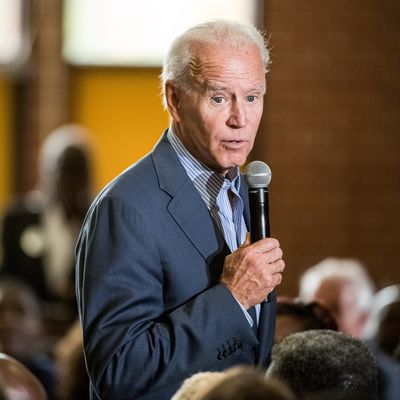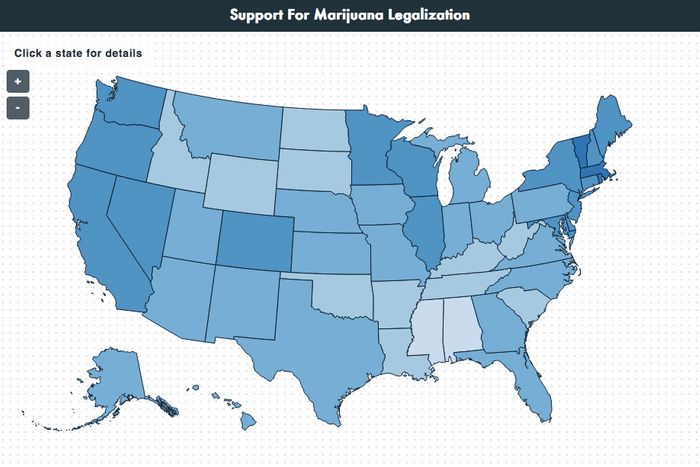
Barack Obama broke his silence on the 2020 Democratic primary Friday with a stern warning to his party’s presidential hopefuls. “Voters, including Democrats, are not driven by the same views that are reflected on certain … Twitter feeds, or the activist wing of our party,” Obama said. “And that’s not a criticism to the activist wing — their job is to poke and prod and text and inspire and motivate. But the candidate’s job, whoever that ends up being, is to get elected.”
The Democratic base will bristle at these sentiments. We all want to believe that the Venn diagram of our preferred policies — and the most electorally expedient ones — is a perfect circle. We all want our leaders to stop mincing words, and start making a bold, unapologetic case for our agenda until its moral truth becomes unmistakable to all (or at least a plurality of voters in Wisconsin). But that just isn’t how politics works. And the stakes of evicting Trump from the Oval Office next year are too high for Democrats to use their presidential primary as a venue for its base’s ideological self-expression. The party’s rank-and-file may revere Joe Biden more than any other candidate. Nevertheless, they must heed Obama’s advice — and recognize that Uncle Joe’s far-out views on weed would harsh the heartland’s vibes.
At a town hall in Las Vegas, Nevada, Saturday, the Democratic front-runner was asked if his longtime opposition to the legalization of marijuana has changed. Here’s how he replied:
No, it hasn’t changed. I think, look, I think states should be able to make a judgement to legalize marijuana. I think that’s okay. But let me tell ya, the truth of the matter is, there’s not nearly been enough evidence that’s been acquired as to whether or not it is a gateway drug. It’s a debate. And I want a lot more, before I legalize it nationally, I want to make sure we know a lot more about the science behind it. That’s why I want to move it from a Schedule 1 drug to a Schedule 3, so you can in fact do this.
This position may play well with anti-legalization activists on Twitter, or nanny-state-loving paleo-progressives. But salt-of-the-earth Americans in flyover country want big government to keep its hands off their bongs.
A Pew Research survey released last week found that 67 percent of Americans believe “the use of marijuana should be made legal.” A recent Gallup poll put that figure at (a statistically identical) 66 percent. Critically, weed legalization isn’t just popular with the public as a whole, but also with key Electoral College constituencies. In Pew’s survey, non-college-educated voters — who are overrepresented in battleground states — were even more likely to support legalization than college-educated ones, with only 31 percent of working-class Americans backing Biden’s stance.
This comports with the findings of a recent poll from the progressive think tank Data for Progress and data-science firm Civis Analytics. By fielding a large-sample national survey and then applying state-of-the-art demographic modeling techniques to its results, DFP was able to estimate the level of support for marijuana legalization in all 50 states. It found legal weed polling at (a very nice) 69 percent among all registered voters in Wisconsin and Pennsylvania, and at 68 percent with such voters in Michigan. Meanwhile, independent voters in those states backed legalization at even higher levels, with nearly three-fourths of indie Michiganders, Wisconsinite, and Pennsylvanians voicing approval (support among independents in Sun Belt battlegrounds like Florida and Arizona was nearly identical). What’s more, in an unsurprising finding — given younger Americans’ relatively high affinity for marijuana and low propensity for casting ballots — support for legalizing weed among registered nonvoters in battleground states hovered around 75 percent. The analysis’s most remarkable finding, however, may have been this: A majority of Trump voters in 49 U.S. states backed an end to weed prohibition.
Marijuana legalization might not be the most important or salient issue of the day. But there simply aren’t many other policy fights that are more favorable to the Democratic Party. Hoping to win back non-college-educated independents in the Rust Belt? Nearly three-quarters of them want Uncle Sam to recognize their right to life, liberty, and the pursuit of dank kush. Want to run a “mobilization” campaign that brings Dem-leaning nonvoters off of democracy’s sidelines? Virtually all of them are high on legal weed. Worried that narrowcasting to targeted constituencies could pull Democrats too far from the American mainstream? Even among Republican voters, a solid majority are 420 friendly.
Biden’s defenders will note that he doesn’t oppose the decriminalization of marijuana possession, only the legalization of its sale. But such equivocation just blunts the Democrats’ advantage on the issue, by needlessly killing the buzz of pro-pot constituencies and advocacy organizations. On weed legalization, the preferred policy of the cause’s most ardent supporters is the same as that of critical swing voters. Biden’s stance demobilizes the former, for the sake of appealing slightly less to the latter. Virtually every other candidate in the 2020 race recognizes the folly of Biden’s stance: Everyone from Amy Klobuchar to Pete Buttigieg to Bernie Sanders has endorsed legalizing recreational marijuana in no uncertain terms.
Biden’s decision to put principle above political expediency on this issue may command respect in some quarters. But we’ve seen where that gets us. Hillary Clinton heeded the radical center’s demands for ideological purity on pot in 2016, and two pro-legalization third-party candidates combined for an exceptionally high share of ballots, thereby eroding her margin for error in key Rust Belt states. Democrats can’t afford to make the same mistake twice. They must hear the subtext of Obama’s advice: It would be nothing short of political malpractice to vote for Joe Biden and his reefer madness.

































